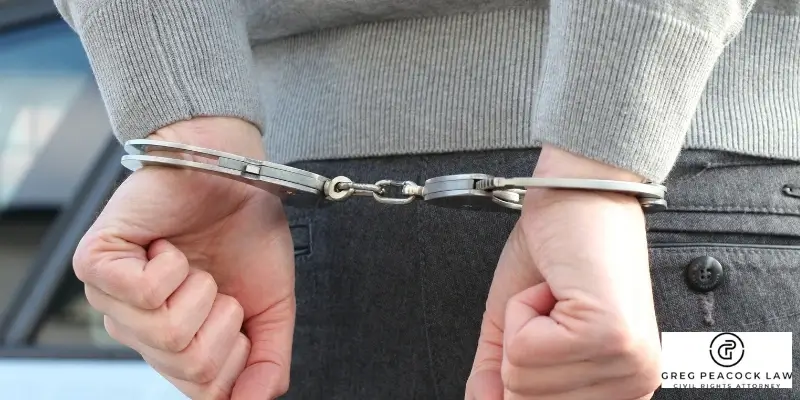|
|
Last Modified on Sep 04, 2025
An individual faces false arrest when law enforcement officers hold them without having legal authority or valid legal justification. False arrests in California and numerous other states represent an infringement upon constitutional rights. Have you wondered whether you can sue for false arrest in California? You can, but be prepared for complex legal procedures. By learning about legal procedures and your rights, you can identify if you have a legitimate claim.
What Is a False Arrest?
False arrest represents an illegal detention since it involves arresting someone without probable cause or legal justification. The Fourth Amendment of the United States Constitution safeguards every person from unreasonable searches and seizures while including arrest as part of this protection. False arrest in California frequently intersects with false imprisonment because false imprisonment involves holding someone against their will without legal justification.
Police officers must have probable cause before making an arrest because it must connect the individual to a crime. An arrest without adequate evidence or without a warrant or consent might constitute a false arrest.
What Constitutes a False Arrest?
To file a claim for false arrest in California, you must show that the arresting officer arrested you without probable cause or legal reasoning. An officer needs reasonable grounds to suspect a crime took place before proceeding with an arrest. Your arrest will be deemed false if an officer detains you without valid grounds.
Law enforcement officers who do not observe legal procedures or rules of conduct, such as making an arrest without a warrant when it is required, may face liability for false arrest. In fact, the National Registry of Exonerations found that official misconduct contributed to 54% of wrongful convictions.
Certain people undergo false arrests because they are misidentified by authorities. An individual may be falsely arrested because of an incorrect identification on a police report or their presence at an inappropriate location at an inopportune time. Even facial recognition technology has faced scrutiny, after three California Black men were wrongfully arrested due to erroneous facial recognition matches, introducing concerns of potential racial bias.
An officer applying excessive force during an unjustified arrest could result in both a false arrest claim and a police misconduct claim. Excessive force during an arrest involves physical violence and the unnecessary use of weapons like tasers and guns.
What to Do If You Are Falsely Arrested in California
When you find yourself falsely arrested in California you need to follow specific actions to protect your rights while establishing your legal position.
Begin writing a detailed account of the arrest as soon as you can. Document the time and place of the encounter and record all details about your interaction with the police officers. Collect contact details from anyone who witnessed the incident.
You must collect supporting evidence when you face an arrest without probable cause or unlawful detention. The evidence collection process might involve video recordings from bystanders as well as security cameras and possibly video from your personal cell phone. Physical evidence, together with witness testimonies, plays an important role in supporting legal claims.
Consider submitting a formal police complaint before proceeding with legal action. Documenting the incident becomes possible through this process while simultaneously notifying your department about the issue. You should understand that submitting a complaint does not automatically lead to any subsequent action.
Seek advice from a skilled legal professional based in California who focuses on police misconduct and civil rights legal matters. An attorney will explain your choices between filing a claim and reaching a settlement while assisting you through the entire legal procedure.
False Arrest Laws in California
There are a few established laws in California that are related to false arrest. These include:
- California Penal Code Section 836. The California Penal Code Section 836 defines the legal criteria for arrests in California. The law permits officers to make warrantless arrests when they possess probable cause that a crime has been committed by the individual. When an officer arrests a person without probable cause, they violate this section, and the arrest becomes false.
- The Bane Act. The Bane Act enables people who have suffered false arrest or civil rights violations to obtain compensation for emotional distress as well as punitive damages and legal costs. People frequently combine Bane Act claims with other civil rights charges like excessive force or false imprisonment.
- California Government Code 820.2. Under California law, government workers, including law enforcement officers, usually have immunity from personal responsibility when they perform their official duties. Officers lose immunity protection when they behave maliciously or recklessly and violate the law. When a law enforcement officer conducts a false arrest without probable cause, they might lose their immunity status.
FAQs
Can You File a Claim for Wrongful Arrest in California?
Yes, you can file a claim for wrongful arrest in California. If law enforcement arrests you without probable cause or legal justification, you may pursue a civil claim. A court ruling in your favor could provide financial restitution for emotional distress and legal expenses. To succeed, you must demonstrate that your rights were violated during the arrest process.
How Much Can You File a Claim for a False Arrest?
The compensation for a false arrest depends on factors such as the severity of the incident and the damages incurred. Potential compensation may include reimbursement for lost wages, emotional distress, medical expenses, and legal fees. In cases where an officer’s actions were particularly egregious, punitive damages may also be awarded.
What Is an Example of a False Arrest?
An example of a false arrest could be an officer detaining someone based solely on an unclear tip or mistaken identity, without sufficient evidence to support the arrest. False arrest occurs when law enforcement detains an individual without adequate probable cause or legal justification for suspecting criminal activity.
What Is an Unlawful Arrest in California?
In California, an arrest is considered unlawful when police officers detain an individual without probable cause or a proper warrant. Under both California and federal law, an arrest becomes unlawful if officers lack sufficient evidence to suspect criminal activity or fail to follow legal procedures, such as informing the individual of their rights.
Contact Greg Peacock Law Today
If you were falsely arrested, you do not have to accept the incident without seeking justice. Greg Peacock Law can help you fight for your rights and for just compensation. Contact us today to get started.





